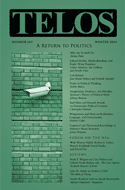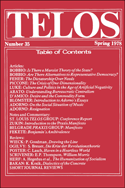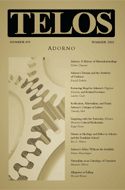By Dimitris Gakis · Monday, January 12, 2015 Dimitris Gakis’s “Wittgenstein and Marx on Reification, Language, and Commonality” appears in Telos 169 (Winter 2014). Read the full version online at the Telos Online website, or purchase a print copy of the issue in our store.
 The article is primarily occupied with some of the affinities that can be discerned between the philosophical outlooks of (later) Wittgenstein and Marx. Starting from a short account of the connections that can be drawn between Wittgenstein and Marx from a historico-biographical and a metaphilosophical point of view, we focus then on three main points on which their philosophical perspectives converge. The first one has to do with Marx’s concept of reification and Wittgenstein’s deep criticism against those approaches to language and meaning that exhibit reificatory characteristics. The second one is related, first, to their common conception of language as a matter of social praxis and their shared rejection of the idea of a private language and, second, to their common prioritization of everyday language over what they often call metaphysical or philosophical language which they take to be a distorted and deceiving form of everyday language. The third and last point regards the shared emphasis of Wittgenstein and Marx on the notion of the “common” and on the communal aspects of human life and praxis. The article concludes with a reference to some of Wittgenstein’s criticisms against certain aspects of Marxist thought, such as scientism, determinism, and economism, and a brief discussion of how Wittgenstein’s later philosophy may be viewed as a (potentially) significant contribution to the cause of personal and social autonomy. The article is primarily occupied with some of the affinities that can be discerned between the philosophical outlooks of (later) Wittgenstein and Marx. Starting from a short account of the connections that can be drawn between Wittgenstein and Marx from a historico-biographical and a metaphilosophical point of view, we focus then on three main points on which their philosophical perspectives converge. The first one has to do with Marx’s concept of reification and Wittgenstein’s deep criticism against those approaches to language and meaning that exhibit reificatory characteristics. The second one is related, first, to their common conception of language as a matter of social praxis and their shared rejection of the idea of a private language and, second, to their common prioritization of everyday language over what they often call metaphysical or philosophical language which they take to be a distorted and deceiving form of everyday language. The third and last point regards the shared emphasis of Wittgenstein and Marx on the notion of the “common” and on the communal aspects of human life and praxis. The article concludes with a reference to some of Wittgenstein’s criticisms against certain aspects of Marxist thought, such as scientism, determinism, and economism, and a brief discussion of how Wittgenstein’s later philosophy may be viewed as a (potentially) significant contribution to the cause of personal and social autonomy.
Continue reading →
By Aaron Bell · Wednesday, April 23, 2014 As an occasional feature on TELOSscope, we highlight a past Telos article whose critical insights continue to illuminate our thinking and challenge our assumptions. Today, Aaron Bell looks at Theodor W. Adorno’s “Resignation” from Telos 35 (Spring 1978).
 Reading “Resignation” today, it is immediately clear that the historical context is necessary to fully grasp the significance of Adorno’s words. Originally delivered as a radio address in 1968, “Resignation” is, among other things, an important entry in the Marxist theory-praxis debate and a primary document in the history of Adorno’s troubled relationship with the radical student movements of postwar Germany. Adorno, responding directly to the Frankfurt School’s critics of the radical left, defends his refusal to translate Critical Theory into a program for political action. Against the charge of apolitical “resignation,” Adorno articulates a defiant vision of critical thought beholden to no master. This vision of critical thought remains vital today, despite the dated trappings of the theory-praxis debate and the limited interest in Adorno’s biography and the politics of postwar Germany. Reading “Resignation” today, it is immediately clear that the historical context is necessary to fully grasp the significance of Adorno’s words. Originally delivered as a radio address in 1968, “Resignation” is, among other things, an important entry in the Marxist theory-praxis debate and a primary document in the history of Adorno’s troubled relationship with the radical student movements of postwar Germany. Adorno, responding directly to the Frankfurt School’s critics of the radical left, defends his refusal to translate Critical Theory into a program for political action. Against the charge of apolitical “resignation,” Adorno articulates a defiant vision of critical thought beholden to no master. This vision of critical thought remains vital today, despite the dated trappings of the theory-praxis debate and the limited interest in Adorno’s biography and the politics of postwar Germany.
Continue reading →
By Timothy Hall · Friday, July 8, 2011 Timothy Hall’s “Reification, Materialism, and Praxis: Adorno’s Critique of Lukács” appears in Telos 155 (Summer 2011). Read the full version online at the TELOS Online website, or purchase a print copy of the issue here.
 This essay focuses on Adorno’s critique of Lukács in Negative Dialectics. While Adorno is generally viewed as a trenchant critic of Lukács, Adorno’s work testifies to a lifelong engagement with Lukács’s early writings, up to and including History and Class Consciousness. The essay looks at the seemingly contradictory critique developed by Adorno that Lukács’s concept of praxis was both idealist and romantic anti-capitalist. It was idealist insofar as a latent subjectivism in his thought led to a “productivist” account of the subject and the social world; it was romantic anti-capitalist in that it opposed an economy based on use value to the capitalist present dominated by the principle of exchange. The essay argues that there is no inconsistency, on Adorno’s part, in maintaining both. Romanticism as a critique is internal to the enlightenment, and the oscillation between idealism and the romantic rejection of it evidenced in Lukács’s work was consistent with the instability at the heart of the idealist account of enlightenment modernity. The essay concludes by speculating on the possibility of an object-centered conception of praxis in Adorno’s work. This essay focuses on Adorno’s critique of Lukács in Negative Dialectics. While Adorno is generally viewed as a trenchant critic of Lukács, Adorno’s work testifies to a lifelong engagement with Lukács’s early writings, up to and including History and Class Consciousness. The essay looks at the seemingly contradictory critique developed by Adorno that Lukács’s concept of praxis was both idealist and romantic anti-capitalist. It was idealist insofar as a latent subjectivism in his thought led to a “productivist” account of the subject and the social world; it was romantic anti-capitalist in that it opposed an economy based on use value to the capitalist present dominated by the principle of exchange. The essay argues that there is no inconsistency, on Adorno’s part, in maintaining both. Romanticism as a critique is internal to the enlightenment, and the oscillation between idealism and the romantic rejection of it evidenced in Lukács’s work was consistent with the instability at the heart of the idealist account of enlightenment modernity. The essay concludes by speculating on the possibility of an object-centered conception of praxis in Adorno’s work.
Continue reading →
|
|
 The article is primarily occupied with some of the affinities that can be discerned between the philosophical outlooks of (later) Wittgenstein and Marx. Starting from a short account of the connections that can be drawn between Wittgenstein and Marx from a historico-biographical and a metaphilosophical point of view, we focus then on three main points on which their philosophical perspectives converge. The first one has to do with Marx’s concept of reification and Wittgenstein’s deep criticism against those approaches to language and meaning that exhibit reificatory characteristics. The second one is related, first, to their common conception of language as a matter of social praxis and their shared rejection of the idea of a private language and, second, to their common prioritization of everyday language over what they often call metaphysical or philosophical language which they take to be a distorted and deceiving form of everyday language. The third and last point regards the shared emphasis of Wittgenstein and Marx on the notion of the “common” and on the communal aspects of human life and praxis. The article concludes with a reference to some of Wittgenstein’s criticisms against certain aspects of Marxist thought, such as scientism, determinism, and economism, and a brief discussion of how Wittgenstein’s later philosophy may be viewed as a (potentially) significant contribution to the cause of personal and social autonomy.
The article is primarily occupied with some of the affinities that can be discerned between the philosophical outlooks of (later) Wittgenstein and Marx. Starting from a short account of the connections that can be drawn between Wittgenstein and Marx from a historico-biographical and a metaphilosophical point of view, we focus then on three main points on which their philosophical perspectives converge. The first one has to do with Marx’s concept of reification and Wittgenstein’s deep criticism against those approaches to language and meaning that exhibit reificatory characteristics. The second one is related, first, to their common conception of language as a matter of social praxis and their shared rejection of the idea of a private language and, second, to their common prioritization of everyday language over what they often call metaphysical or philosophical language which they take to be a distorted and deceiving form of everyday language. The third and last point regards the shared emphasis of Wittgenstein and Marx on the notion of the “common” and on the communal aspects of human life and praxis. The article concludes with a reference to some of Wittgenstein’s criticisms against certain aspects of Marxist thought, such as scientism, determinism, and economism, and a brief discussion of how Wittgenstein’s later philosophy may be viewed as a (potentially) significant contribution to the cause of personal and social autonomy.  Reading “Resignation” today, it is immediately clear that the historical context is necessary to fully grasp the significance of Adorno’s words. Originally delivered as a radio address in 1968, “Resignation” is, among other things, an important entry in the Marxist theory-praxis debate and a primary document in the history of Adorno’s troubled relationship with the radical student movements of postwar Germany. Adorno, responding directly to the Frankfurt School’s critics of the radical left, defends his refusal to translate Critical Theory into a program for political action. Against the charge of apolitical “resignation,” Adorno articulates a defiant vision of critical thought beholden to no master. This vision of critical thought remains vital today, despite the dated trappings of the theory-praxis debate and the limited interest in Adorno’s biography and the politics of postwar Germany.
Reading “Resignation” today, it is immediately clear that the historical context is necessary to fully grasp the significance of Adorno’s words. Originally delivered as a radio address in 1968, “Resignation” is, among other things, an important entry in the Marxist theory-praxis debate and a primary document in the history of Adorno’s troubled relationship with the radical student movements of postwar Germany. Adorno, responding directly to the Frankfurt School’s critics of the radical left, defends his refusal to translate Critical Theory into a program for political action. Against the charge of apolitical “resignation,” Adorno articulates a defiant vision of critical thought beholden to no master. This vision of critical thought remains vital today, despite the dated trappings of the theory-praxis debate and the limited interest in Adorno’s biography and the politics of postwar Germany.  This essay focuses on Adorno’s critique of Lukács in Negative Dialectics. While Adorno is generally viewed as a trenchant critic of Lukács, Adorno’s work testifies to a lifelong engagement with Lukács’s early writings, up to and including History and Class Consciousness. The essay looks at the seemingly contradictory critique developed by Adorno that Lukács’s concept of praxis was both idealist and romantic anti-capitalist. It was idealist insofar as a latent subjectivism in his thought led to a “productivist” account of the subject and the social world; it was romantic anti-capitalist in that it opposed an economy based on use value to the capitalist present dominated by the principle of exchange. The essay argues that there is no inconsistency, on Adorno’s part, in maintaining both. Romanticism as a critique is internal to the enlightenment, and the oscillation between idealism and the romantic rejection of it evidenced in Lukács’s work was consistent with the instability at the heart of the idealist account of enlightenment modernity. The essay concludes by speculating on the possibility of an object-centered conception of praxis in Adorno’s work.
This essay focuses on Adorno’s critique of Lukács in Negative Dialectics. While Adorno is generally viewed as a trenchant critic of Lukács, Adorno’s work testifies to a lifelong engagement with Lukács’s early writings, up to and including History and Class Consciousness. The essay looks at the seemingly contradictory critique developed by Adorno that Lukács’s concept of praxis was both idealist and romantic anti-capitalist. It was idealist insofar as a latent subjectivism in his thought led to a “productivist” account of the subject and the social world; it was romantic anti-capitalist in that it opposed an economy based on use value to the capitalist present dominated by the principle of exchange. The essay argues that there is no inconsistency, on Adorno’s part, in maintaining both. Romanticism as a critique is internal to the enlightenment, and the oscillation between idealism and the romantic rejection of it evidenced in Lukács’s work was consistent with the instability at the heart of the idealist account of enlightenment modernity. The essay concludes by speculating on the possibility of an object-centered conception of praxis in Adorno’s work. 

